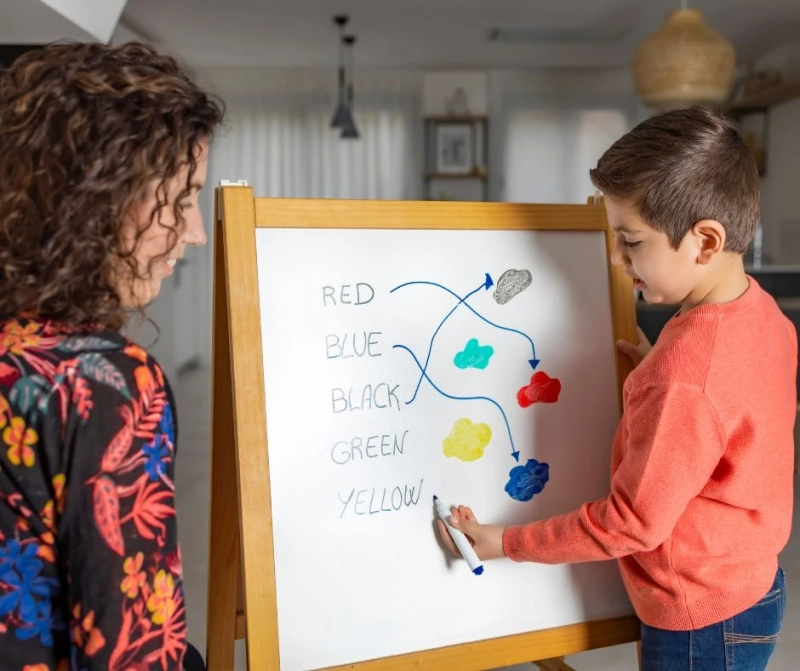Attending preschool is an exciting and important milestone in a child's life. It is a time when they begin to explore and learn about the world around them in a structured and supportive environment.
Preschool provides children with the opportunity to develop social, emotional, cognitive, and physical skills that are crucial for their future success.
One of the benefits of attending preschool is that it helps children build social skills. They learn how to interact with peers and adults, take turns, share, and communicate effectively.
These skills are essential for building positive relationships and developing empathy and understanding of others.
In addition to social skills, preschool also helps children develop cognitive skills.
They learn about numbers, letters, shapes, and colors, which are the building blocks of academic success. Preschool also provides opportunities for children to develop problem-solving and critical thinking skills through play-based learning activities.
Physical development is another important aspect of preschool. Children have the opportunity to participate in outdoor activities, games, and sports that promote physical fitness and gross motor skills. Additionally, preschool can help children develop fine motor skills through activities such as drawing, painting, and cutting.
Attending preschool can also have a positive impact on a child's emotional development. It can help them develop self-confidence, independence, and a sense of belonging. Preschool provides a safe and nurturing environment where children can express themselves, learn to manage their emotions and develop coping skills.
Benefits Your Child Will Gain By Attending A Preschool
Develop Social and Emotional Skills
Preschool is an important time for children to develop their social and emotional skills. In the preschool setting, children learn to interact with their peers, show empathy for others, and regulate their emotions.
Through play-based activities and guided social interactions, preschoolers can learn important skills such as sharing, taking turns, and problem-solving.
Teachers and caregivers can also help children healthily navigate feelings such as frustration, sadness, and anger. By developing these skills during the preschool years, children are better prepared to build positive relationships and be successful in school and beyond.
Enhance Cognitive and Language Skills
Preschool education is designed to enhance the cognitive and language skills of young children. During this stage, children learn to interact with others, express themselves, and develop their language skills.
They also develop their cognitive skills through activities that encourage problem-solving, critical thinking, and creativity. Preschool education helps children develop their social, emotional, and academic skills, which are essential for their future success.
By providing a stimulating and nurturing environment, preschool education prepares children for a lifetime of learning and development.
Learn to Follow Routines and Rules
Preschool is an educational setting where young children learn to follow routines and rules. It is a place where they are taught how to behave in a structured environment and how to interact with their peers.
Through a variety of activities and games, children learn to listen to instructions, share, take turns, and respect others.
Preschool is an important step toward developing the social, emotional, and cognitive skills that will help them succeed in future academic and personal endeavors.
Build Self-Confidence and Independence
A preschool is a place where young children in the age group of 2-5 years can learn, play and grow in a safe and nurturing environment.
It is designed to help children build confidence and independence by encouraging them to explore new things, develop social skills, and learn basic academic concepts. In preschool, children engage in age-appropriate activities that promote their cognitive, physical, emotional, and social development.
Through play, art, music, and storytelling, children learn to express themselves and communicate effectively with others. Preschool is an important step in a child's educational journey, laying the foundation for a lifetime of learning and development.
Promote Creativity and Imagination
Preschool is a learning environment designed to foster creativity and imagination in young children. Through age-appropriate activities and play, children are encouraged to explore the world around them, express themselves through art, music, and storytelling, and develop their social and emotional skills.
Preschool teachers provide a safe and nurturing space where children can develop their independence, curiosity, and sense of wonder, laying a strong foundation for future learning and development.
Improve Physical Development Through Outdoor Play
Preschool is an educational setting where young children are introduced to a variety of activities that promote their physical, emotional, and cognitive development.
An important aspect of preschool is outdoor play, which encourages children to engage in physical activities that improve their gross motor skills, coordination, balance, and overall health.
Through outdoor play, children learn to explore their environment, interact with their peers and develop a love of physical activity that can last a lifetime.
Prepare for Kindergarten and Future Academic Success
Preschool is an early childhood education program designed for children between the ages of three and five. It aims to prepare them for kindergarten and future academic success.
Preschool provides a safe and stimulating environment where children can learn and grow through play-based activities, social interaction, and structured learning experiences.
The curriculum focuses on developing essential skills such as language, literacy, maths, science, and social-emotional development. By attending preschool, children can get off to a good start in their education, build self-confidence, and develop a love for learning that will serve them well in their academic careers.
Foster a Love of Learning and Curiosity About the World
Preschool is a stage of early childhood education that focuses on fostering a love of learning and curiosity about the world.
It is designed for children aged 2-5 and includes activities that help them develop their social, emotional, cognitive, and physical skills.
Preschool provides a safe and nurturing environment where children can learn through play, exploration, and discovery.
The curriculum covers a variety of subjects such as reading, writing, math, science, and the arts, and is taught through fun and interactive methods that encourage active participation.
Overall, preschool lays the foundation for a child's lifelong learning journey and helps them develop essential skills that will benefit them throughout their lives.


